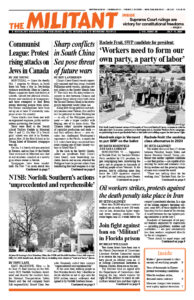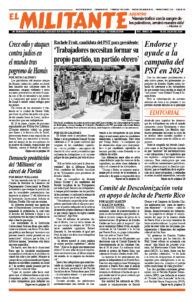In a victory upholding crucial constitutional freedoms, the U.S. Supreme Court threw out the use of an anti-business fraud statute to target Joseph Fischer for his part in the Jan. 6, 2021, melee at the Capitol. This was rapidly followed by the court ruling that Donald Trump does have immunity from prosecution for official actions he took when he was president.
These rulings deal blows to Democrats’ efforts to use the courts to imprison the former president. They reinforce rights needed by working people and the unions today and in battles to come.
The Fischer ruling applies to hundreds of others prosecuted by the Justice Department for participating in Jan. 6 activities, as well as similar charges filed against Trump by special counsel Jack Smith. It sets back the Joseph Biden administration’s efforts to frame up his chief challenger in the 2024 election and his supporters.
Fischer, a former cop from Jonestown, Pennsylvania, was among hundreds indicted for actions on Jan. 6. He was charged with assaulting an officer, entering and remaining in a restricted building and engaging in disorderly and disruptive conduct. Those charges carry maximum penalties ranging from six months to eight years in prison.
The prosecutions have unfolded as the White House and Democrats have tried to whip up hysteria over an “attempted coup” on Jan. 6. Looking to inflict the harshest punishment possible, Department of Justice prosecutors tacked on a charge of “obstructing an official proceeding” under the Sarbanes-Oxley Act. This law was adopted by Congress after Enron auditor Arthur Andersen shredded papers during the company’s collapse and bankruptcy.
Indicting Fischer under this law allowed prosecutors to seek a much longer sentence, up to 20 years.
Fischer’s trial has been on hold since June 2022 pending the results of his legal challenge. Some 350 other Jan. 6 defendants have been charged under the Sarbanes-Oxley Act to boost their potential sentences. Of these, 52 people were convicted and sentenced solely under the anti-business fraud statute. Twenty-seven are currently in prison.
The Sarbanes-Oxley Act criminalizes anyone who “alters, destroys, mutilates or conceals a record, document or other object” to prevent its use in “an official proceeding.” But the government using the statute against Jan. 6 defendants “reaches beyond the scenario that prompted the legislation,” Chief Justice John Roberts wrote for the court majority in a 6-3 ruling.
“Under the Government’s interpretation, a peaceful protester could conceivably be charged,” Roberts wrote, “and face a 20-year sentence.”
Within weeks of the Jan. 6 riot, Michael Sherwin, then the top federal prosecutor in D.C., promised a campaign of “shock and awe” against anyone involved. With the aid of the FBI, his office systematically investigated and issued charges against 1,400 people.
Attorney General Merrick Garland said he was “disappointed” with the high court’s Fischer ruling, but would find other ways to target Jan. 6 defendants. Within hours of the Supreme Court decision, the Washington, D.C., District Court had to reopen proceedings on some of the convictions.
Special counsel Smith filed two obstruction charges under the Sarbanes-Oxley Act against Trump as part of a four-part indictment claiming he conspired to overturn the 2020 election.
Trump granted partial immunity
The Supreme Court July 1 in a 6-3 vote ruled that Trump has immunity from prosecution for official acts he carried out as president. The president “may not be prosecuted for exercising his core constitutional powers, and he is entitled, at a minimum, to a presumptive immunity from prosecution for all his official acts,” Roberts wrote for the court majority. The ruling has limits. “Not everything the President does is official,” he added.
The court threw out parts of Smith’s indictment charging Trump used the Justice Department to advance his claim of election fraud. Other allegations against him are sent back to the trial judge to determine whether his actions actually fell within his official duties or not before the trial can proceed.
In an angry dissenting opinion, Judge Sonia Sotomayor claimed, “The President is now a king above the law.”
Roberts says this makes a mockery of the Constitution. “Like everyone else the President is subject to prosecution in his unofficial capacity,” he wrote. “But unlike anyone else, the President is a branch of government, and the Constitution vests in him sweeping powers. … The dissents’ positions in the end boil down to ignoring the Constitution’s separation of powers.”
Following the ruling, New York Judge Juan Merchan postponed Trump’s July 11 sentencing on his hush money conviction. Merchan says he will rule on whether Trump has immunity Sept. 6 and, if it’s still necessary, sentence the presidential candidate Sept. 18.
The Supreme Court has “gone rogue,” former House Speaker Nancy Pelosi claimed after the ruling.
Squad member Rep. Alexandria Ocasio-Cortez went further. She said she would file impeachment charges against some Supreme Court justices for the decision, which she claims is “an assault on American democracy” that threatens to put the country on a path to tyranny.
She failed to mention that members of Congress also have immunity from prosecution for official acts in office.
Much of the liberal fury toward the court has centered on the fact that its decision will likely delay the case until after the election. In Democrats’ eyes this undercuts the reason for bringing the charges in the first place. Their partisan goal was to prevent tens of millions from being able to vote for the candidate of their choice.
For working people the key issue that must be fought in Smith’s case is his targeting of free speech. Trump is charged for what he said to Vice President Michael Pence about challenging the reported 2020 election results; for what he said to various state officials urging them to do what they could to uncover voting fraud; and for his remarks at a rally at the U.S. Capitol Jan. 6 where, among other things, he urged his supporters to act peacefully.
Regardless of whether anyone agrees with his opinions, they are protected by the First Amendment. Safeguarding protections written into the Constitution is deeply in workers’ interests, regardless of the fact that it’s Trump — a candidate of one of the bosses’ parties — who is under attack. In the long run, it is the working class that will be the target of these kinds of assaults.

